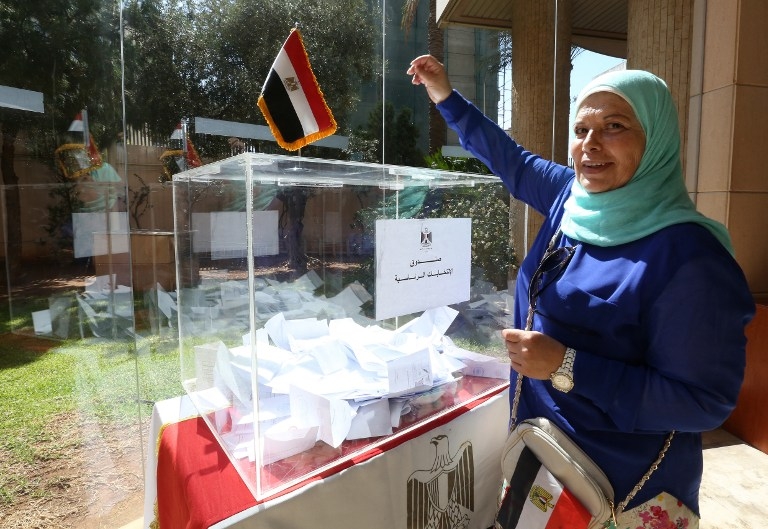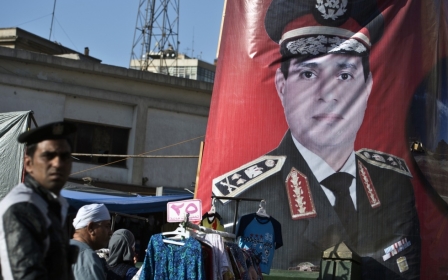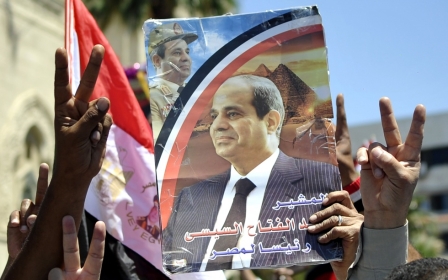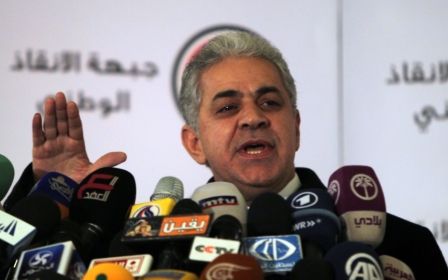Voting for Egyptian expatriates starts around the world

While voting procedures for Egyptians abroad have been simplified to encourage wider participation, many expatriatess are either unaware of the elections’ start date, apathetic about taking part or boycotting the elections altogether.
Expatriate Egyptians will be casting ballots for four days, from 15-18 May, in the country's presidential elections in which former army chief Abdel-Fattah al-Sisi is set to face off against leftist politician Hamdeen Sabahi.
There are 141 voting stations in 124 countries with Libya, Syria, Somalia and the Central African Republic being exceptions due the security conditions there, according to a statement by the Assistant Foreign Minister for Consular Affairs Ali-Ashiri at a press conference in Cairo.
"The election commission has provided many facilities to allow Egyptians to vote overseas," Foreign Ministry spokesman Badr Abdel-Ati said in a statement.
While there are no exact figures regarding the number of eligible Egyptian voters living overseas, according to the Egyptian Foreign Ministry records, turnout figures are expected to double from last year’s estimated 311,000 expat voters in the Saudi Arabia. Egyptians in the Kingdom account for more than 50 percent of the total number of Egyptians registered for voting at all Egyptian foreign missions.
New MEE newsletter: Jerusalem Dispatch
Sign up to get the latest insights and analysis on Israel-Palestine, alongside Turkey Unpacked and other MEE newsletters
Consul-General Adel al-Alfy told Arab News that the decision of the presidential election commission to cancel the need for advance registration for those working in foreign countries would increase the number of voters significantly.
“Cancelling advance registration enables any qualified Egyptian voter outside the country to proceed to the nearest mission and cast his vote provided he fulfils the other conditions,” he said.
Furthermore, regular operations at the consulate, with the exception of emergency cases, will be suspended during the four voting days in order to provide voters with an election environment, while staff will be assigned election duties,” added the diplomat.
Like most embassies, the Egyptian Embassy in Washington only posted a news page on its website on 8 May to notify Egyptians of the ballot dates and that they could cast their votes without prior registration, if they were registered on the database and have a valid Egyptian national ID card or passport.
While the dates for voting for Egyptians abroad have been announced through Egyptian media, many Egyptians expatriates are not aware of the procedural changes or that voting has even started.
“I didn’t even know it [the ballot] was happening,” said Walaa Quisay, a 22-year-old MA student at University of Exeter said.
Dina Abd El-Aziz, 27-year-old student at New York University was not only unaware of the start date but also of prior registration being lifted.
“I didn't realise it [the voting] was happening until yesterday when I read it on Facebook…totally forgot to register, not that my vote really matters at this point,” said Abd El-Aziz who said that although she is happy Morsi is gone she will be abstaining out of apathy knowing that Al-Sisi will undoubtedly win.
At the same time, others are keen to participate and will take part over the next few days.
Nabil Al Nashar, 24 year-old radio host on Qatar Foundation Radio who will vote on Saturday said, “I believe it [voting] may make a difference in my country.”
While, Al-Nashar believes that Egyptians are prone to support a hero or warrior-like figure whom they see in Al-Sisi, he also thinks that Al-Sisi’s “win will not be a slam dunk” if more of the opposition go to the ballot box.
Malika Wagih (not her real name) 27-year-old housewife living in Doha said she has not yet decided if she will vote, “Although I don’t think it is a fair game, we can’t all just stand by and watch.”
Al-Sisi was quoted in his Reuters interview on 15 May saying, “We have more than 50 million voters. I hope they will all vote. This is an opportunity to express their will.”
Meanwhile, other Egyptians abroad have decided to boycott the electoral process. Many of them are Muslim Brotherhood supporters who believe the ousting of Mohamed Morsi was an illegitimate process.
Salma Ashraf, a 29-year-old human-rights activist living in Istanbul, said she will be “boycotting because it's an illegitimate election…we have one elected president Dr Morsi”.
Likewise, Israa Amr Shareef, a 29-year-old housewife living in Tunis said, “I'm boycotting, it's an illegitimate election, plus it's not like my vote would actually count.”
Although the number of Egyptian expats voting is not expected be large, many Egyptians believe the majority who do vote will support Sisi.
Ihab Elhawary, a 30-year-old film director living in Kuwait said, "The majority of Egyptians here [UAE] vote for Sisi; he is a great and responsible man, and I believe the country will change with him as president."
Egyptians will elect a new president on 26-27 May in the second phase of a transitional roadmap coordinated by the army following last July's ouster of Mohamed Morsi by the military.
According to a poll conducted in February by Baseera, an Egyptian centre for public opinion research, 81% of the respondents in urban governorates said they would take part in the elections. According to a more recent poll conducted by the same centre, 76% of the respondents will vote for Al-Sisi while, only 2% will vote for Sabahi.
Baseera has been heavily quoted in Egyptian state and independent media including Al-Aharam and Almasry Alyoum.
Middle East Eye delivers independent and unrivalled coverage and analysis of the Middle East, North Africa and beyond. To learn more about republishing this content and the associated fees, please fill out this form. More about MEE can be found here.




